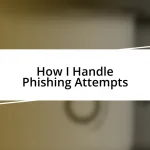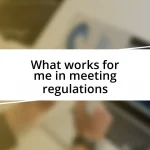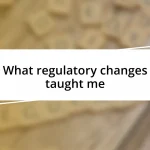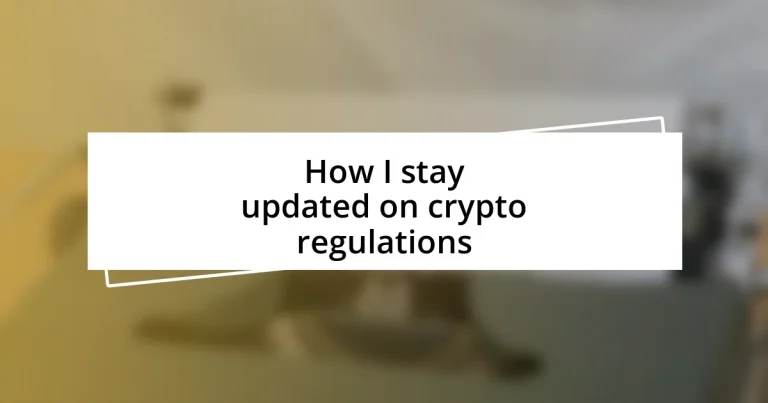Key takeaways:
- Regulations in cryptocurrency establish trust, protect investors, and help differentiate between legitimate projects and scams.
- Engaging with reliable news sources, regulatory agencies, and community forums enhances understanding of market dynamics and informs investment strategies.
- Setting alerts for regulatory changes enables proactive decision-making, keeping users informed of essential updates in the fast-moving crypto landscape.
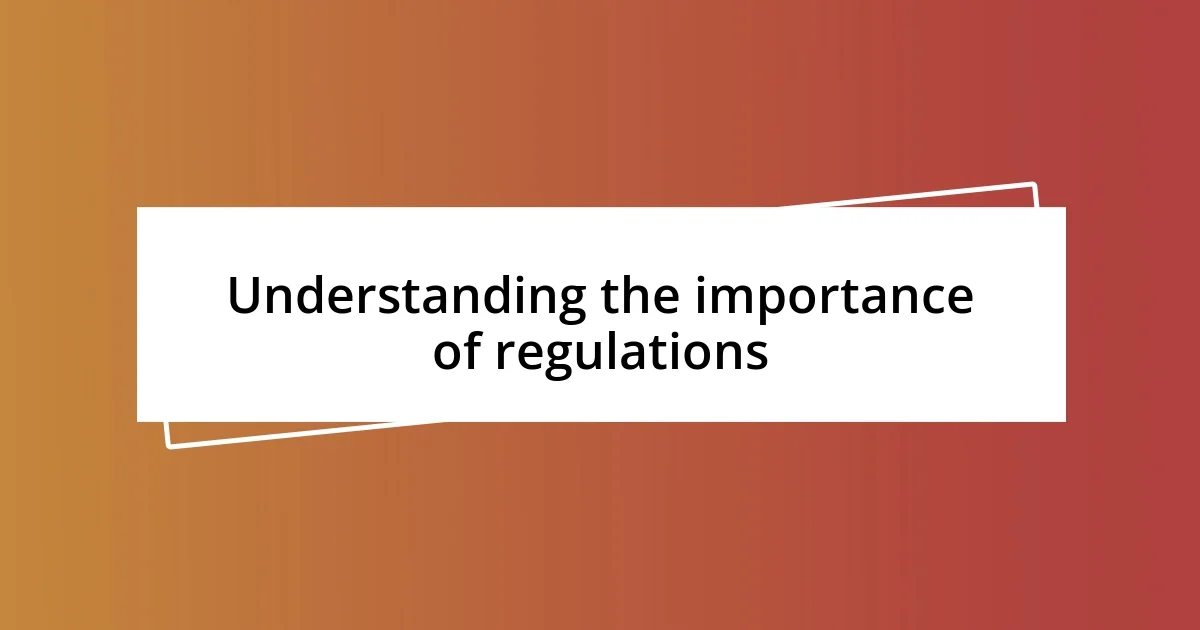
Understanding the importance of regulations
Regulations in the cryptocurrency space serve as a safety net for both investors and the overall market. I remember feeling a wave of relief when new guidelines were introduced because it meant that there would be a framework to deter fraud and protect genuine users like myself. Have you ever felt anxious about investing in something so volatile? That reassurance can make a significant difference.
When regulations are clear, they create an environment of trust. I’ve witnessed firsthand how well-regulated exchanges attract more users simply because people feel safer knowing there are rules in place. It’s fascinating to think about how a simple piece of legislation can transform an entire industry’s credibility.
Moreover, regulations help differentiate between legitimate projects and scams. During my exploration of various cryptocurrencies, I often found myself questioning the integrity of certain initiatives. It was these regulations that provided me with the necessary tools to identify trustworthy opportunities, allowing me to invest my time and resources with more confidence. How empowering is it to navigate this complex landscape with clearer guidelines?
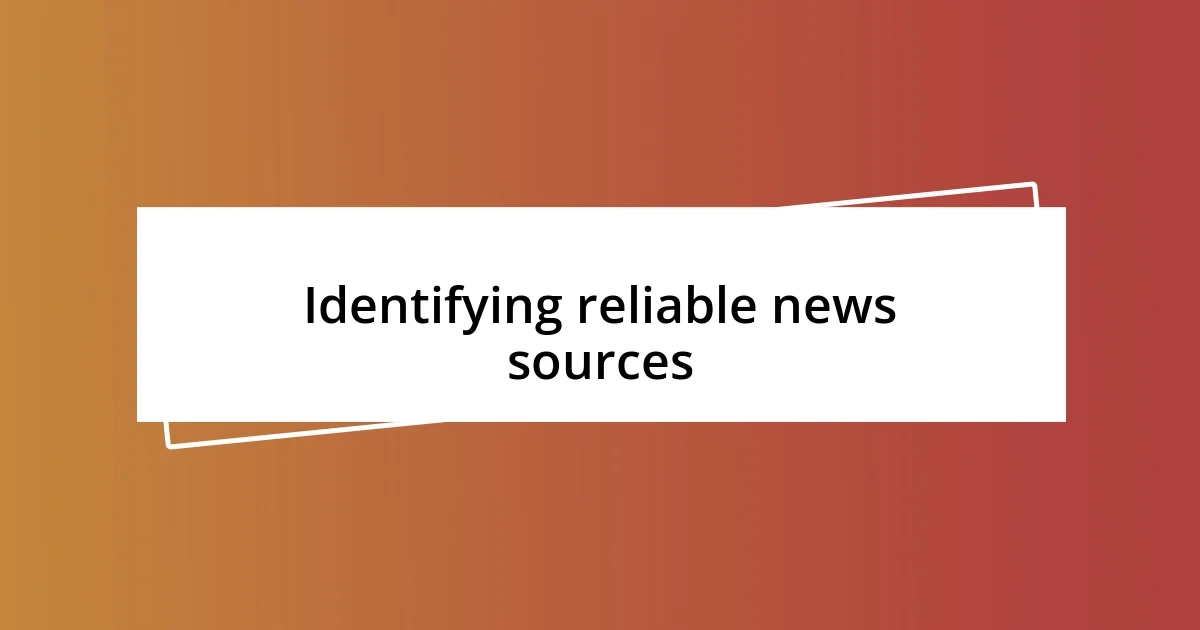
Identifying reliable news sources
When it comes to staying informed about cryptocurrency regulations, identifying reliable news sources is crucial. I often find myself sifting through various platforms, and it’s eye-opening how quickly misinformation can spread. I’ve learned to look for sources that not only provide accurate reporting but also have a reputation for integrity and transparency, which fosters a sense of trust in the information I’m consuming. Sometimes, I even check the original publications for deeper context, as it helps me gauge the reliability of secondary coverage.
Here’s a quick list of what I consider essential criteria for spotting dependable news sources:
- Expertise: Look for outlets with seasoned journalists who specialize in finance or cryptocurrency.
- Transparency: Prefer sources that disclose their funding and affiliations to understand potential biases.
- Fact-checking: Ensure the outlet has a strong reputation for accuracy and corrections when mistakes are made.
- Community feedback: Engaging with online forums can help gauge the credibility of a news source based on collective experiences.
- Balanced reporting: I value sources that present multiple viewpoints rather than sensationalized or overly opinionated headlines.
By focusing on these criteria, I feel more confident about the information I’m following and, ultimately, my investment decisions.
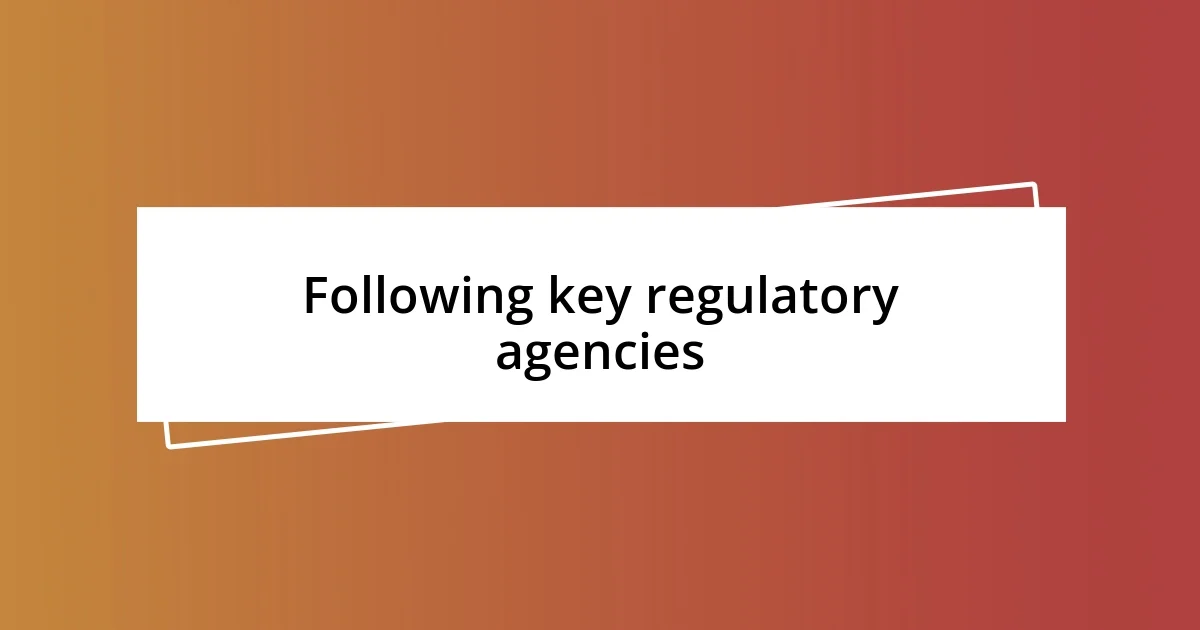
Following key regulatory agencies
Following key regulatory agencies is essential in understanding the evolving landscape of cryptocurrency regulations. I regularly keep an eye on agencies like the SEC (Securities and Exchange Commission) and the CFTC (Commodity Futures Trading Commission). Their updates can significantly influence how I approach my investments; a simple announcement can shift market dynamics overnight. Just recently, I was studying a particular coin when the SEC made headlines for taking action against a questionable ICO. That taught me to always be vigilant and adapt to regulatory changes.
Understanding the roles of both local and international regulatory bodies broadens my perspective. For instance, the European Central Bank (ECB) is also making strides in shaping crypto regulation in Europe. Whenever I come across regulations proposed by these agencies, I take a step back to analyze their potential impact. It’s like putting together pieces of a puzzle; understanding how these various agencies interact helps my overall strategy. Have you ever noticed how regulatory actions can create both opportunities and challenges in the crypto space? It keeps me on my toes!
I’ve found that engaging with the publications and reports released by these regulatory agencies can be incredibly insightful. Each report often contains projections and guidelines that not only educate me but also prepare me for potential consequences in the market. Just the other day, while reading a CFTC report, I felt a sense of clarity wash over me when they outlined their approach to virtual currencies. Knowing that I can rely on these agencies for guidance allows me to invest with a bit more confidence—don’t you think that peace of mind is crucial in such a volatile market?
| Regulatory Agency | Key Role |
|---|---|
| SEC | Oversees securities law; regulates ICOs and crypto trading platforms. |
| CFTC | Regulates commodity futures and options markets; oversees derivatives involving cryptocurrencies. |
| ECB | Influences monetary policy and regulatory frameworks in Europe; assesses crypto’s potential risks. |

Joining cryptocurrency forums and communities
Joining cryptocurrency forums and communities has been a game-changer for me. It’s fascinating to engage with a diverse group of individuals who share a passion for the crypto space. For instance, I found a thread discussing the implications of a new regulation, and the insights from other users made me rethink my initial stance. Isn’t it rewarding to find a community that challenges your perspective and encourages deeper critical thinking?
One of my favorite aspects of these communities is the real-time exchange of information. I remember a night when news broke about sudden regulatory changes in another country. Within minutes, my forum was buzzing with discussions and analyses, each person adding a unique perspective that enriched the comprehension of the situation. It’s like having a live news desk at your fingertips! How often do you get the chance to collaborate with fellow enthusiasts to dissect evolving events?
Participating in these forums also helps me build relationships with like-minded individuals. Occasionally, I come across veteran investors who share their journeys and experiences. Their stories resonate deeply with me, serving both as motivation and cautionary tales. It’s empowering to learn from others’ successes and missteps, right? Every conversation and shared insight adds another layer to my understanding of crypto regulations, helping me navigate this intricate world with greater confidence.

Subscribing to regulatory newsletters
Subscribing to regulatory newsletters has become an invaluable part of my routine. I often find myself eagerly awaiting updates from organizations like the SEC, CFTC, and other regulatory bodies. Those newsletters contain a trove of information, including insightful analyses and summaries of new regulations that can shape the market. It feels like having a front-row seat to the evolving landscape—don’t you agree that being ahead of the curve can be a game-changer in the crypto world?
I remember the first time I received a newsletter that outlined upcoming regulations for decentralized finance (DeFi). The precision in their language intrigued me, highlighting the potential impact of those rules on the projects I was interested in. I couldn’t help but feel a sense of urgency to adjust my investment strategy based on that insight. It’s fascinating how a simple email can shift my perspective and prompt me to take action, right?
What I appreciate most is the clarity these newsletters provide in navigating complex regulatory jargon. Terms that once seemed overwhelming start to make sense, as real-world implications of those regulations unfold quickly. It’s like having a guide through the wilderness of crypto compliance. Once, after reading about privacy regulations, I instantly understood how they might affect certain coins I was considering. This kind of knowledge is empowering—how do you think staying informed influences your decision-making?

Utilizing social media for updates
Utilizing social media for updates has truly transformed how I consume information in the crypto space. Platforms like Twitter are invaluable because I can follow industry leaders and regulatory experts who share timely insights. I recall a time when I stumbled upon a tweet that triggered a discussion about a pending regulation; it opened my eyes to how quickly news travels and how important it is to stay ahead. Have you ever considered how a single tweet can spark a crucial conversation that shapes our understanding of crypto?
I often find myself browsing hashtags like #CryptoRegulations, which can lead to remarkable discussions. Just the other day, I saw a thread where users unpacked the nuances of new regulations in a way that felt accessible and relatable. Each post was like a mini-news report, each reply adding another layer of understanding. It reminded me of how social media is not just a platform for sharing but a rich source of knowledge and perspectives. How often do we overlook this valuable tool that’s right under our noses?
Engaging with the community through retweets and comments has also allowed me to form connections with others who share similar interests. An instance that stands out was after a major regulatory announcement when my tweet received a flood of responses from crypto enthusiasts around the world. We exchanged ideas, and some of those interactions led me to resources I hadn’t yet discovered. It was a powerful reminder that in the ever-evolving landscape of crypto regulations, collaboration and shared insights can be game changers. Isn’t it incredible how social media brings people together for a common purpose?
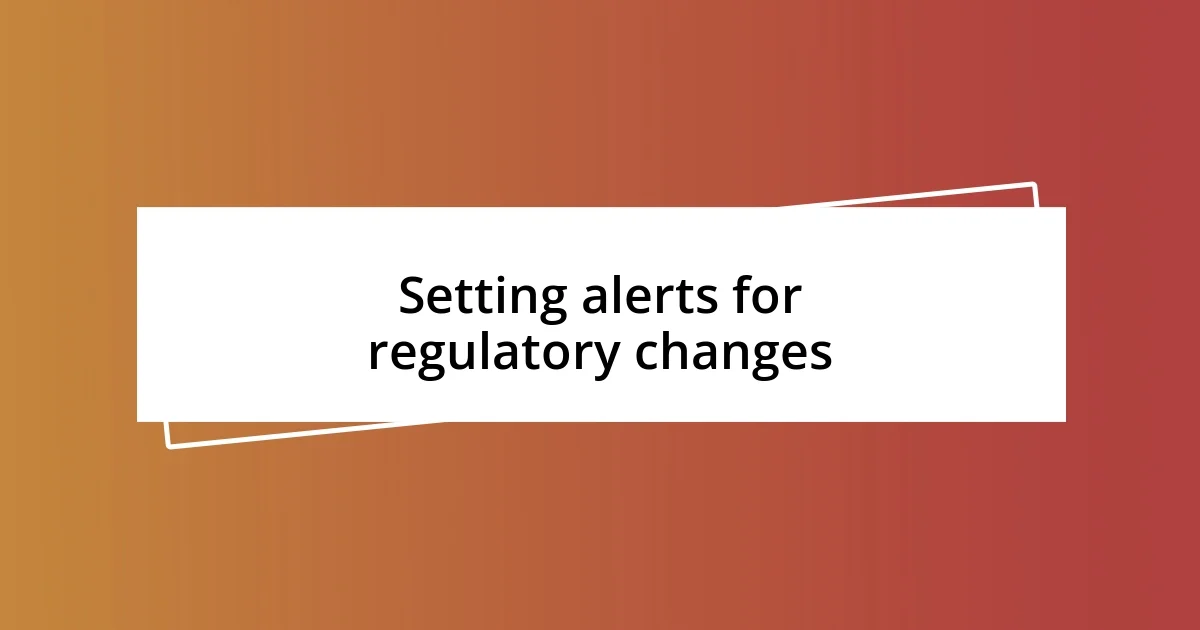
Setting alerts for regulatory changes
Setting alerts for regulatory changes has been a game changer for me in the ever-shifting world of crypto. I use tools like Google Alerts or specially designed apps to notify me whenever new regulations are proposed or amended. One evening, I was unwinding after a long day when my phone pinged with an alert about a new SEC proposal. My heart raced; I quickly dug into the details and realized it had potential implications for some assets I was holding. Isn’t it astonishing how swiftly news can influence our investment decisions?
I’ve found that customizing my alerts based on specific keywords, like “crypto regulation” and “blockchain compliance,” helps refine the information I receive. This targeted approach means I’m not sifting through tons of irrelevant news—not to mention the thrill of being among the first to catch breaking news. I vividly remember a time when an alert informed me of an emergency meeting about regulatory compliance for NFTs. Those swift updates encourage me to stay proactive rather than reactive in my strategy. Have you ever felt that rush of adrenaline when you realize you’ve just received critical information that could impact your portfolio?
Additionally, integrating these alerts into my daily routine provides a sense of structure. I often set aside ten minutes each morning to review any updates that came through while I slept. It’s almost ritualistic, allowing me to start my day informed and ready to make decisions. I can’t help but wonder how many others miss out on opportunities simply because they haven’t adopted this practice. By making the effort to set these alerts, I feel empowered, like I’m taking control of my crypto journey. Wouldn’t you agree that knowledge is a powerful tool in this dynamic market?








